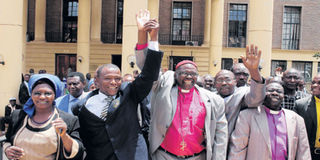Church leaders flock to the courts to fight legal battles as mediation fails

African Independent Pentecostal Church of Africa Archbishop Amos Mathenge (centre) outside Milimani Law Courts. Archbishop Amos Mathenge has been sued over claims he illegally acquired the church’s title deeds. FILE PHOTO |
What you need to know:
- Dr Mutunga even once said that people should resort to black magic to solve their disputes, a statement he later clarified saying he only wanted to rub in the idea of seeking alternative dispute resolutions.
- According to Dr Mutunga, the cost, length of time and the injury that can be caused by trying to prove a case in court often place justice out of the reach of many people. Taking every dispute to court also burdens the justice system and dilutes the quality of justice.
Informal justice systems of dispute resolution have been in existence worldwide since time immemorial.
In such a system, disputes are resolved without involving litigation or court processes.
This process is well embedded in the Constitution to reduce the backlog of cases within the Judiciary.
Chief Justice Willy Mutunga has been at the forefront of advocating for the system so that more cases are resolved through dialogue.
Dr Mutunga even once said that people should resort to black magic to solve their disputes, a statement he later clarified, saying he only wanted to rub in the idea of seeking alternative dispute resolutions.
“Once in court, many people realise belatedly that their contests become irrevocably adversarial, and the outcome often damages relationships within families, neighbourhoods and communities,” the CJ says.
According to Dr Mutunga, the cost, the length of time and the injury that can be caused by trying to prove a case in court often place justice out of the reach of many people. Taking every dispute to court also burdens the justice system and dilutes the quality of justice.
There are several methods of dispute resolution, including preventing the dispute in the first instance, negotiation, mediation and arbitration.
One of the major institutions that can spearhead the processes are religious institutions, including churches. Most of the time, when people have problems, they are advised to seek the counsel of their religious leaders.
However, a trend has emerged where churches, often viewed as the centre of hope, are washing their dirty linen in public and crowding the courts with numerous cases.
Their disputes in court leave the faithful — who would naturally look at the church leadership in times of disputes to help resolve their problems — with nothing but hopelessness.





